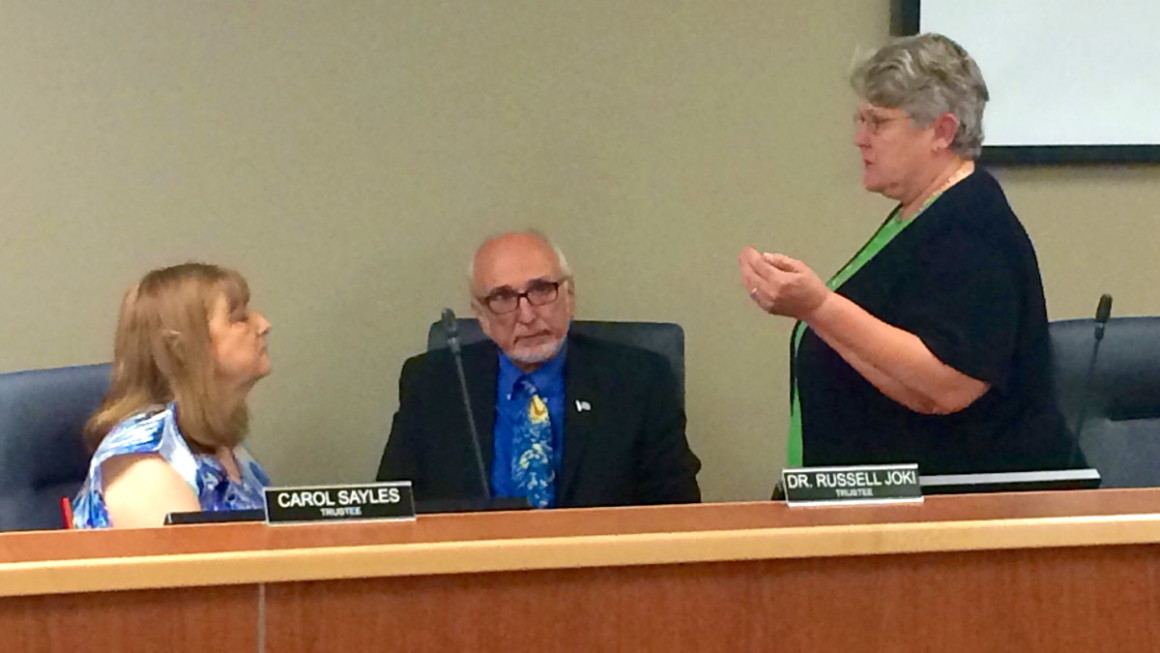Linda Clark has spent 37 years working in Meridian-area schools. She has seen the suburban school district mushroom from 9,700 students to an enrollment of nearly 37,000 — with all the pressures and construction demands that come with growth.
But for Clark, the past few weeks have been particularly tumultuous.

On July 31, Gov. Butch Otter appointed the West Ada School District superintendent to a vacant seat on the State Board of Education. The news surprised many observers – even fellow educators who support Otter’s decision. Critics, also blindsided by the news, question how Clark can juggle the two jobs, and suggest the State Board post constitutes a conflict of interest.
Meanwhile, Clark is facing increased scrutiny from district trustees — and not just because of her State Board appointment. This week, the board voted down a staff hire recommended by Clark. Another sensitive, lingering issue is a decision to extend Clark’s contract through 2018, a decision made by a divided and lame-duck board.
Clark says she’s been taken aback by the criticism, but says she isn’t going anywhere. At 66, retirement is not on her mind. “I don’t have an exit strategy,” Clark said in an interview this week.
The State Board appointment
The State Board of Education is as far-reaching as it is high-profile. Composed of seven gubernatorial appointees and the elected state schools superintendent, the board charts education policy for K-12 and higher education.
While the State Board plays an unusual dual role, the panel has often focused its attention on higher ed, leaving much of the work on K-12 to the superintendent and the State Department of Education. But to Clark’s way of thinking, the lines between K-12 and postsecondary schools are blurring. In her district, for example, high school students earned 20,387 college credits in 2014-15.
Clark served on Otter’s education task force in 2013 — a varied 31-member group that arrived at a series of recommendations on everything from increasing teacher pay and boosting teacher funding to embracing Common Core standards and shifting to mastery-based learning. Two years later, in recommending Clark for the State Board, Otter hailed Clark’s “wealth of knowledge and experience in education K-through-career.”

For district superintendents such as Geoffrey Thomas, Clark’s appointment promises local administrators an advocate on the State Board.
“I think it’s really beneficial,” said Thomas, superintendent of Rexburg’s Madison School District, who served with Clark on Otter’s education task force. “I was very pleased.”
Boise Superintendent Don Coberly agreed. “I think Linda’s always been an advocate for schools statewide.”
School administrators were surprised by Otter’s appointment, and at last week’s Idaho Association of School Administrators conference, some were still processing the news. But the response has been favorable, IASA Executive Director Rob Winslow said.
There is precedent — both recent and historic — for appointing a State Board member with K-12 ties. Last summer, Otter appointed Debbie Critchfield, a Cassia County School District spokeswoman who had spent a decade on the local school board. In 1994, then-Gov. Cecil Andrus appointed Carole McWilliam, principal at Pocatello High School.
Nonetheless, the Clark appointment is controversial. In a stinging editorial this week, Lewiston Tribune opinion writer Marty Trillhaase said the Clark appointment plays into Otter’s “penchant for cronyism,” and questioned how Clark could juggle her district’s best interests against those of the state. “Otter’s decision … doesn’t create the mere appearance of a conflict of interest,” Trillhaase wrote. “It is the very definition of a conflict.”
New West Ada trustee Russell Joki won’t go that far. But Joki is rankled that he didn’t know about the appointment before Otter announced it — and he isn’t sure whether the appointment constitutes a conflict. “I’d like to know,” he said this week.
Clark dismisses the suggestion of conflict of interest. The State Board sets policy in broad strokes, and in the event of a conflict of interest, she says she will recuse herself from a vote. She also says she will look at the statewide implications of State Board policies, as she has in her work with the IASA. “And I’m a person that will reach out to folks.”
Tensions on school board
Clark’s dual roles came into stark focus this week. On Wednesday and Thursday, she took part in her first State Board meeting — coincidentally enough, in Meridian. On Tuesday evening, Clark participated in a tense 3 ½-hour school board meeting, as trustees covered only a handful of topics on a lengthy agenda, saving others for a subsequent meeting.
At one point, the board went against Clark’s recommendation and refused to hire a $100,000-a-year assessment director — even though several principals and district staff members also argued for the position.
The 3-2 vote wasn’t the first clash between the board and Clark, and it portends more conflict in the future. For Joki, who led the opposition to the hire, a vote against the assessment director constituted a vote for fiscal conservatism. In 2016, the district is gearing up to ask voters to renew a $14 million-a-year supplemental levy — and Joki says the district needs to show it is holding the line on spending.
Fifteen-year board veteran Mike Vuittonet voted for the hire, and does not hide his chagrin with Tuesday’s vote. “They wanted to send a message,” he said Thursday.
There’s no small irony in this internal struggle over spending. Throughout her 11 years as superintendent — and particularly during the recession — Clark has made frugality one of her talking points. She has continually said that West Ada has maintained student performance, while spending less per pupil than comparable districts across the country. (In 2014-15, West Ada spent $6,744 per pupil, ranking No. 101 among Idaho’s 115 districts.) Coberly, the head of the state’s second-largest district, praises Clark for doing a good job with limited resources.
Still, West Ada will have to go to voters for money next year. Probably twice. In addition to the supplemental levy, the district’s 10-year, $200 million plant facilities levy expires in 2017, and the district will likely seek a renewal in 2016. If tensions linger between Clark and trustees, she fears a backlash at the polls. “You’re asking the public to have confidence in the school district.”
At least at some level, the conflict takes on a personal undertone. In June, trustees voted 3-2 to retain Clark for 2015-16 — and extend her contract until June 2018. But two of the trustees who supported the extension are gone from the board, replaced by Joki and fellow newcomer Julie Madsen. When Joki publicly questioned the extension, he caught Clark off guard.
What the future holds
While Clark’s five-year State Board term begins immediately, the appointment is up for Senate confirmation in 2016. It’s not unheard of for the Senate to reject an Otter nomination; in 2013, lawmakers blocked Joan Hurlock’s appointment to the Fish and Game Commission. But in 2014, new State Board members Critchfield and David Hill sailed through the confirmation process.
Clark’s future in West Ada is another question.
Clark concedes the last few weeks have been “a little rocky.” But in the past, trustees have seen the value in collaboration, and she hopes the new board members will follow suit.
Joki also envisions a “productive” relationship, in time. “I’m still learning what her strengths are, and she’s probably doing the same.”
However, Vuittonet isn’t sure what to expect. “It’s very difficult right now. … I think there’s a lot of anxiety about how this board is going to do, what it’s going to do.”

History suggests one thing. When trustees and a superintendent are at odds, for an extended period of time, it’s usually the superintendent who leaves. Trustees will buy out a superintendent’s contract — as was the case in Blaine County in 2013 and Caldwell this year. Trustees can make a job so miserable that a superintendent leaves, Winslow said.
“Those five people, they’re who you work for,” he said. “When you’re not supported in that position, how long do you want to be in that position?”
Clark says she wants to stay in the district where she has spent nearly her entire career. But, she says, her relationship with trustees could make her rethink her exit strategy.
“Isn’t that the way with everyone?”
